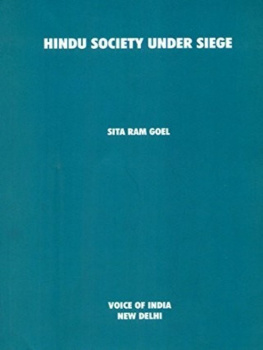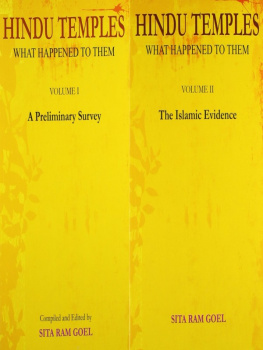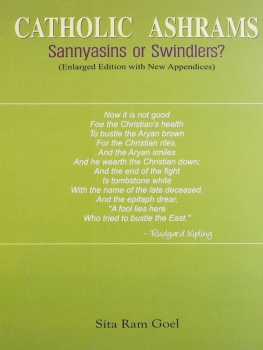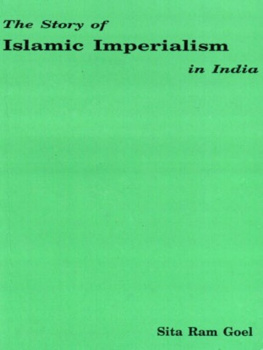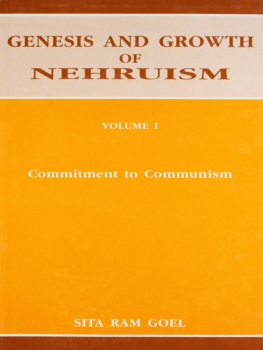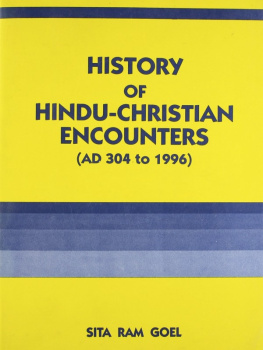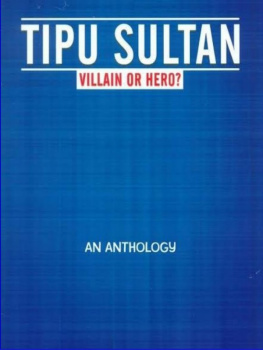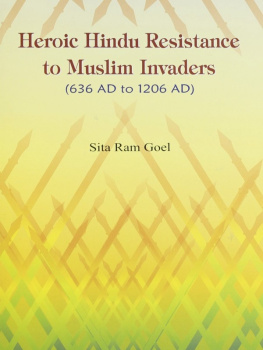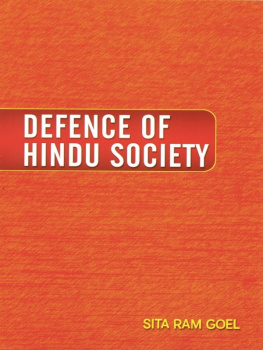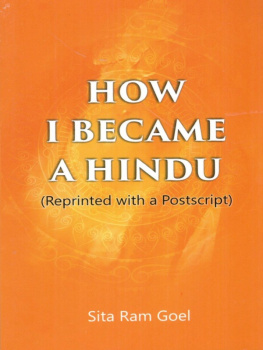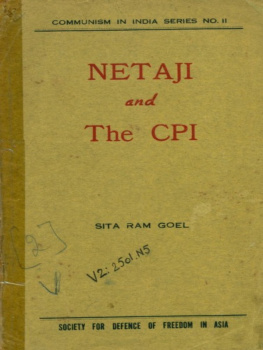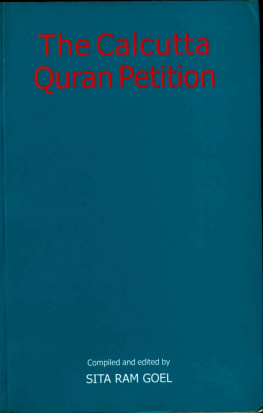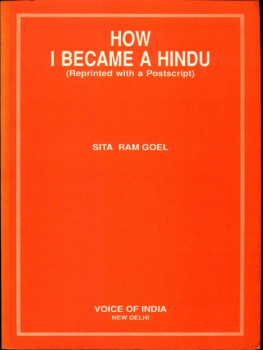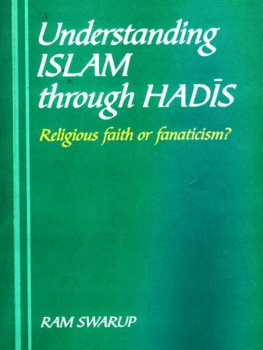
Hindu Society Under Siege
Pages
Hindu Society Under Siege
This book was produced in EPUB format by the Internet Archive.
The book pages were scanned and converted to EPUB format automatically. This process relies on optical character recognition, and is somewhat susceptible to errors. The book may not offer the correct reading sequence, and there may be weird characters, non-words, and incorrect guesses at structure. Some page numbers and headers or footers may remain from the scanned page. The process which identifies images might have found stray marks on the page which are not actually images from the book. The hidden page numbering which may be available to your ereader corresponds to the numbered pages in the print edition, but is not an exact match; page numbers will increment at the same rate as the corresponding print edition, but we may have started numbering before the print book's visible page numbers. The Internet Archive is working to improve the scanning process and resulting books, but in the meantime, we hope that this book will be useful to you.
The Internet Archive was founded in 1996 to build an Internet library and to promote universal access to all knowledge. The Archive's purposes include offering permanent access for researchers, historians, scholars, people with disabilities, and the general public to historical collections that exist in digital format. The Internet Archive includes texts, audio, moving images, and software as well as archived web pages, and provides specialized services for information access for the blind and other persons with disabilities.
Created with abbyy2epub (v.1.7.4)
Author
Published by Voice of India,
2/18 Ansari Road, New Delhi - 110002
Contents
1. Significance of Hindu Society
2. The Residue of Islamism
3. The Residue of Christianism
4. The Residue of Macaulayism
5. The Communist Conspiracy
6. The United Front of Hostile Forces
1. Significance of Hindu Society
Hindu society is the only significant society in the world today which presents a continuity of cultural existence and functioning since times immemorial.
Most other societies known to human history-East and West, North and South-have suffered a sudden interruption and undergone a traumatic transformation due to the invasion and victory of latter-day ideologies-Christianity, Islam, Communism. The pre-Christian, pre-Islamic and preCommunist cultural creations of these societies are now to be met only in libraries and museums, thanks to the labours of antiquarian scholars.
Hindu culture can meet the same frightful fate if there were no Hindu society to sustain it. This is the point which is not always remembered even by those who take pride in Hindu culture.
There are many Hindus who cherish the great spiritual traditions of Hinduism and its scriptures like the Gitaand the Upanishads in which that tradition is enshrined. But they do not cherish with an equal enthusiasm the Hindu society which has honoured and preserved these traditions and scriptures down the ages.
Again, there are many Hindus who proclaim with great confidence that Sanatana Dharma that is Hinduism can never die. This is true in a sense. There will always be individuals in non-Hindu societies who will recover the mystique of Sanatana Dharma through their efforts at self-discovery. But Sanatana Dharma will surely suffer an eclipse and no more inform mankind at large with its message, if there is no Hindu society to sustain it.
Lasdy, there are many Hindus who are legitimately proud of Hindu art, architecture, sculpture, music, painting, dance, drama, literature, linguistics, lexicography, and so on. But they seldom take into account the fact that this great wealth of artistic, literary and scientific heritage, will die if Hindu society which created it is no more there to preserve, protect and perpetuate it.
But the death of Hindu society is no longer an eventuality which cannot be envisaged. This great society is now besieged by the same dark and deadly forces which have overwhelmed and obliterated many ancient societies. Suffering from a loss of its elan, it has become a house divided within itself. And its beneficiaries no more seem to be interested in its survival because they have fallen victims to hostile propaganda. They have developed towards it an attitude of utter indifference, if not downright contempt. Let no Hindu worth his salt remain complacent. Hindu society is in mortal danger as never before.
It would be relevant to recall the history of Hindu society in order to put the record straight. For, there is very little in that record which invites indifference or contempt, and a good deal which deserves honour and homage.
A word about misunderstandings first. At one time the dominant school of Western historians and their Indian disciples, for whom Hindu history commenced with Alexanders invasion, presented this history as a series of successful foreign invasions to which Hindu India invariably succumbed. They even invented an Aryan invasion of India in the second millennium BC to round up their cherished image of this country as some sort of a free for all into which any adventurer could descend and dwell at will.
The Aligarh school of historians have come out with the thesis that Hindu society being basically an oppressive and exploitative society since its very inception, the invaders did not have to mount much of an effort in order to break whatever resistance it could muster at any time. The minority of oppressors, we are told, retired into fortified towns and citadels, and the majority of oppressed masses came out in support of the invaders who were hailed as liberators.
The Marxist historians, in their turn, have welcomed this Aligarh approach with open arms. Their materialist interpretation of history stands vindicated. They have extended the Aligarh thesis to mean that the invaders were not only liberators on the social and political plane but also great incentives to forces of production. These foreign invasions, we are informed, were thus so many steps out of economic stagnation and towards material and social progress.
It is little use crossing swords with the stalwarts inspired by Mecca and Moscow. It has been seen again and again that whatever be the facts, their conclusions remain the same. Their conclusions remain the same because their motives are the same. The motives are to malign and misrepresent Hindu history in order to denigrate and destroy Hindu society. Now many Indians too have joined the game.
Responsible Western historians, however, concede that Hindu history is much, very much, older than Alexanders invasion. They also concede that the theory of an Aryan invasion of India is at best a conjecture for which there is no positive evidence, literary or archaeological. They admit further that the account which the Hindus gave of themselves in the face of foreign invaders has been quite creditable and by no means dishonourable. And they agree that whenever the Hindus suffered a defeat it was largely due to their neglect of and consequent inferiority in the art of warfare rather than any serious defect or deficiency in their social system or cultural milieu.
There was a time, not very long ago, when Hindu culture was a revered culture throughout the civilized world. Its seers and sages, its mystics and monks, its scholars and scientists, its missionaries and merchants took its message to the farthest corners of world-East Africa, Egypt and Ethiopia; Sumeria, Assyria, Babylonia, Chaldea and Iran; Burma, China, Japan, Korea and Mongolia; Indochina, Indonesia, Malaysia and Thailand; Pacific Islands, West Indies, Mexico, Peru and Columbia; Asia Minor, Central Asia, Greece and Rome. The history of a hundred cultures and nations provides evidence of this hoary heritage in their religions and philosophies, languages and literatures, sciences and technologies, manners and mores.
Next page
